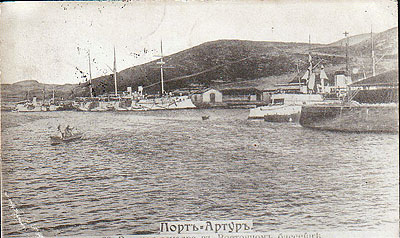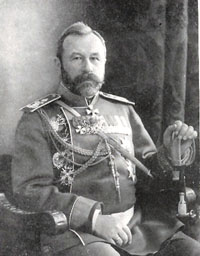
Port Arthur (Lu-shun), where the trouble began
Russian and Japanese interests in
the Far East had been on a collision course since the early 1890s;
both countries were interested in taking part in the dismemberment of
China. In the rush to divide up the spoils, there were some
slight disagreements over who was to get what (OK, I'm oversimplifying a bit;
but the Russians felt that they could get away with another partition
of Poland--substitute China for Poland--but the Japanese were not going
to let that happen.). The Russians also had a very racist attitude
towards the Japanese and did not take the Japanese military seriously.
The Russians had control of the Liaodong Peninsula in the south of Manchuria. (It is the peninsula to the west of the Korean Peninsula jutting out into the Yellow Sea.) Port Arthur at the bottom of the peninsula had been fortified by the Russians as a major naval base, with a spur line of the Trans-Siberian Railway built to supply the port. For the Japanese, Port Arthur was a crucial point that needed to be controlled if the Japanese were going to conduct military operations in Manchuria.
The Japanese sent an ultimatum to the Russians and then broke off diplomatic relations on 6 February 1904. On the night of 8-9 February, the Japanese navy launched a surprise attack against the Russian Pacific Fleet based in Port Arthur, damaging two Russian battleships (See Lt. Tadayoshi Sakurai: The Attack upon Port Arthur, 1905). Later attempts by the Russian Pacific Fleet to leave Port Arthur for Vladivostok were not successful because of the Japanese blockade.
The ensuing Siege of Port Arthur by the Japanese army and navy from 1 August 1904 - 2 January 1905 (See also Port Arthur - The Great Siege and The fall of Port Arthur) became the crucial battle of the war. Port Arthur finally surrendered after the Russian commander decided, on humanitarian rather than military grounds, that the garrison should surrender rather than subject the troops and the civilian population to further suffering. A cease-fire was ordered, and after a few days of negotiations, the Japanese accepted the Russian surrender.

Tsushima Straits and the Dogger Bank Incident
Zinovii Petrovich Rozhdestvenskii (1848-1909) had served a long time in the Russian navy, all the way back to the 1877-78 Russo-Turkish War. (Almost all of the Russian commanders in the Russo-Japanese War had seen some sort of action in the Turkish War.) The tsar ordered Rozhdestvenskii to take the Baltic Fleet from St. Petersburg half way around the world and relieve the Russian Pacific Fleet bottled up in Port Arthur. It took almost six months to get the fleet prepared for its voyage, with the ships only setting out in early October 1904.
Destiny was not going to smile happily on Rozhdestvenskii. On the night of 8-9/21-22 October 1904, as the Russian fleet sailed through the Dogger Bank off the coast of Denmark, some panicky Russian gunners opened fire on British fishing trawlers in the belief that they were (or were hiding in their midst) Japanese torpedo boats (cite). The Dogger Bank (or Hull) Incident became a huge scandal (and perhaps a clear testament to the incompetence of the Russian Navy) as the British Navy then actually chased down the Russian fleet and blockaded it in a port in Spain until diplomacy resolved the issue.
After what could only have seemed to have been an endless voyage, the Russian fleet reached the vicinity of the Yellow Sea. To get to Vladivostok (Port Arthur had been captured by the Japanese in the interim), the Russians chose to sail through the Tsushima Strait between Korea and Japan near the Tsushima Island group. In the battle of Tsushima Straits (14-15/27-28 May 1905) the Japanese fleet destroyed almost the entire Russian Baltic fleet (See Tsushima Straits). The Japanese lost only three torpedo boats while Russian losses included 21 ships sunk, 7 captured and 6 disarmed.

Battle of Mukden or Shenyang (20 February - 10 March 1905)
General Aleksei Kuropatkin (1848-1925) had led a long and distinguished military career, having been active in military campaigns in both Central Asia and then the Russo-Turkish War of 1877-78. He had held a number of commands before becoming the Minister of War. In 1904 he resigned as minister in order to take personal command of the Russian Army in Manchuria.

Whatever he may or may not have been, Kuropatkin certainly knew that it was going to be difficult for Russia to maintain its war effort in the east, since all supplies would have to travel over the single-tracked Trans-Siberian Railway. He also recognized that Manchuria wasn't worth a war; clearly saw that Russia's current military situation was inadequate to gain a swift victory; and he didn't underestimate the Japanese Army and its ability to wage war. His was a voice of reason that was dismissed by the Czar and others as Russia stumbled towards the Manchurian War. Still, he had assumed command.
In the Battle of Mukden, the Russian forces of about 370,000 troops faced the Japanese armies of approximately 250,000 troops in one of the largest land battles ever to take place before World War I. (This was definitely a precursor of the brutal trench warfare that would happen during World War I, if anyone had bothered to look closely.) Russian casualties included about 26,500 killed and 25,000 wounded (40,000 taken prisoner), while the Japanese lost about 75,000 men. Although the battle had little real strategic importance, the Russian defeat did convince the tsar to accept U.S. President Theodore Roosevelt's offer of mediation.

In the Treaty of Portsmouth, which had been negotiated by Sergei Witte, the Russians really did not fare all that badly (although they thought that the treaty was a disaster). Russia ceded to Japan the southern half of Sakhalin Island (recovered by Stalin in 1952), transferred their control of Port Arthur to the Japanese, agreed to evacuate Manchuria and recognized Korea as a Japanese sphere of influence (later annexed by Japan in 1910).
One last note. Since this was the first major war of the twentieth century, it was also the first major war with "modern" press coverage. There were many accounts published about the war, and there were a lot of pictures/photographs made available to the world's population in the forms of magic lantern slides, stereoscopes, postcards, etc. So, it was not quite television bringing the image of war into the living rooms of people, but there was imagery available to people now. A lot of this material now finds its way onto online auction sites.
See these websites for more information: